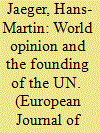| Srl | Item |
| 1 |
ID:
078737


|
|
|
|
|
| Publication |
2007.
|
| Summary/Abstract |
Activists, officials, and academics alike have often linked observations about an emerging global civil society to an incipient democratization of world politics. Global civil society is assumed to bring public scrutiny and "bottom-up" politics to international decision making "from outside" formal political institutions. Based on an analysis of uses of the concept of global civil society in 1990s global governance discourse (especially related to the major UN world conferences), this paper argues that the presumed democratization of world politics is better understood in terms of a double movement: on the one hand, "global civil society" depoliticizes global governance through the promotion of "human security" and "social development"; on the other hand, the emerging international public sphere (in the UN context) operates as a subsystem of world politics rather than opposing the system from outside. Practices of depoliticization are thus part of the political logic of (neo-)liberal global governance. The argument draws on Luhmann's systems theory and Foucault's analysis of governmentality
|
|
|
|
|
|
|
|
|
|
|
|
|
|
|
|
| 2 |
ID:
085398


|
|
|
|
|
| Publication |
2008.
|
| Summary/Abstract |
While `world opinion' is a staple in political discourse, the concept has received little attention in IR. Locating it along the `realist-idealist' divide, existing studies have conceptualized `world opinion' empirically, as an aggregative or intersubjective phenomenon, annexed or opposed to state sovereignty, and embodying a normative standard. Drawing on Luhmann's conception of public opinion and Foucault's governmentality approach, this article reconceptualizes `world opinion' discursively (functionally and semantically), as a medium of communication that enables post-sovereign forms of international governance irrespective of an inherent normativity.
|
|
|
|
|
|
|
|
|
|
|
|
|
|
|
|